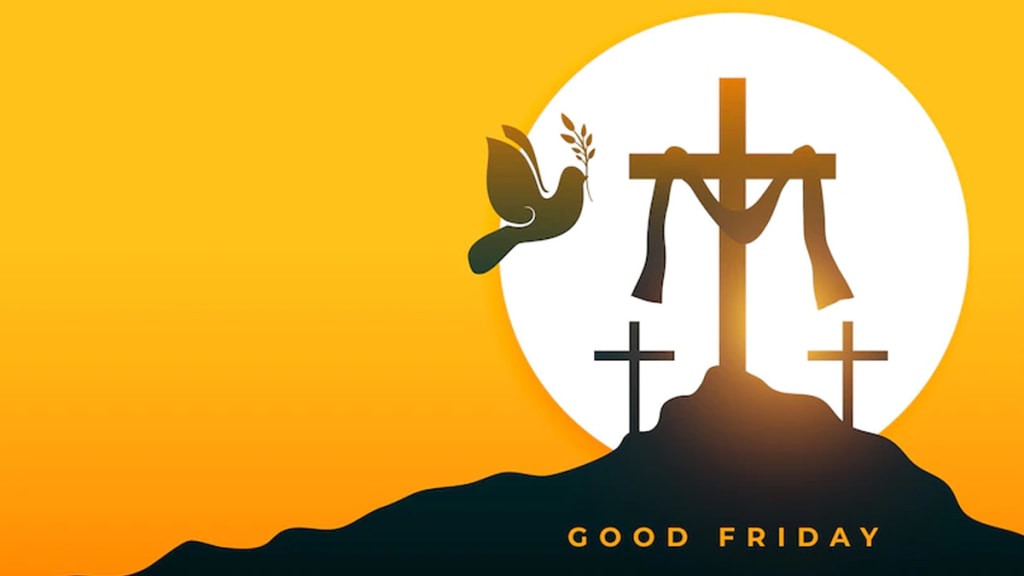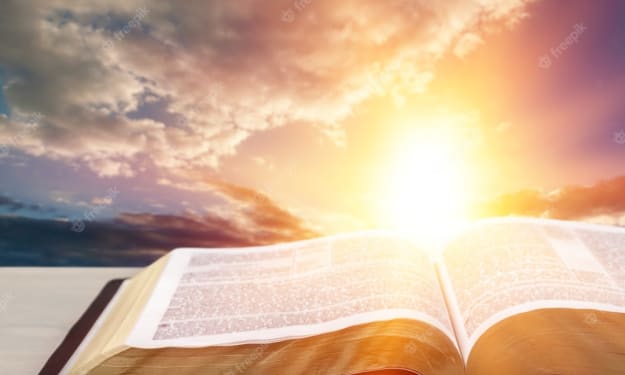
The Seven sayings
According to the Christian tradition, Jesus spoke seven phrases while he was on the cross, as recorded in the Gospels. Here is one possible interpretation of those seven sayings:
1. "Father, forgive them, for they do not know what they are doing." (Luke 23:34)
Jesus asks God to forgive those who are crucifying him, showing his mercy and love even in the midst of suffering.
"Father, forgive them, for they do not know what they are doing" is a statement made by Jesus Christ while he was being crucified on the cross. This statement is recorded in the Bible in the book of Luke, chapter 23, verse 34.
There are several interpretations of what Jesus meant by this statement. One interpretation is that he was asking God to forgive the Roman soldiers and Jewish leaders who were responsible for his crucifixion, as they did not fully understand the significance of what they were doing. Another interpretation is that he was asking for forgiveness on behalf of all humanity, as we are all sinners in need of God's forgiveness.
Regardless of the interpretation, the statement reflects Jesus' love and compassion for all people, even those who were responsible for his suffering and death. It also highlights his belief in the power of forgiveness and the importance of extending forgiveness to others, even in the face of great harm and injustice.
Song 1:
Verse 1:
Father, forgive them, for they know not what they do
Though they condemn me to this fate, I pray for them anew
For in your mercy and your grace, their souls may yet renew
Father, forgive them, for they know not what they do
Chorus:
Oh, how great your love for us
That even in this hour of pain and loss
You offer up a prayer for those
Who cause you harm, and draw you close
Verse 2:
Father, forgive us, for we too are lost in sin
Blind to the harm we cause, the brokenness within
Yet in your Son, we see the path to life again
Father, forgive us, for we too are lost in sin
Chorus:
Oh, how great your love for us
That even in this hour of pain and loss
You offer up a prayer for those
Who cause you harm, and draw you close
Bridge:
May your forgiveness be our guide
As we seek to love and serve with grace inside
For in your mercy, we find new life
And walk with you in peace and light
Chorus:
Oh, how great your love for us
That even in this hour of pain and loss
You offer up a prayer for those
Who cause you harm, and draw you close.
2. "Truly I tell you, today you will be with me in paradise." (Luke 23:43)
Jesus promises the repentant thief who is crucified next to him that he will join him in heaven that very day, demonstrating his power to forgive and save.
"Truly I tell you, today you will be with me in paradise" is another statement made by Jesus Christ while he was being crucified on the cross. This statement is recorded in the Bible in the book of Luke, chapter 23, verse 43.
Jesus made this statement in response to one of the criminals who was being crucified next to him. The criminal had recognized Jesus' innocence and asked him to remember him when he came into his kingdom. Jesus' response was to assure the criminal that he would be with him in paradise that very day.
This statement is significant for a number of reasons. First, it shows Jesus' love and compassion for even the worst of sinners, as he offered forgiveness and hope to a criminal who had lived a life of wrongdoing. Second, it demonstrates Jesus' power and authority to forgive sins and offer eternal life to those who put their trust in him. Third, it shows that salvation is not based on good works or religious rituals, but on faith in Jesus Christ as the Son of God.
Overall, this statement is a powerful reminder of Jesus' love, mercy, and grace, and the hope of eternal life that is available to all who believe in him.
Song 2:
Verse 1:
To the thief beside me, I offer this gift
Salvation freely given, for you to uplift
Though you may have lived a life of sin and rift
In my kingdom, with me, you'll soon find your lift
Chorus:
Oh, how great your mercy and your grace
To offer us a path to a new place
Where we are welcomed and embraced
Through the sacrifice of your love and grace
Verse 2:
To the thief beside me, I offer this hope
A future not defined by the past, but one that's whole
Though the world may have cast you aside, you'll cope
With me, in paradise, you'll find your role
Chorus:
Oh, how great your mercy and your grace
To offer us a path to a new place
Where we are welcomed and embraced
Through the sacrifice of your love and grace.
3. "Woman, here is your son... Here is your mother." (John 19:26-27)
Jesus entrusts his mother to the care of the beloved disciple John, showing his concern for his family even as he dies.
"Woman, here is your son... Here is your mother" is another statement made by Jesus Christ while he was being crucified on the cross. This statement is recorded in the Bible in the book of John, chapter 19, verses 26-27.
Jesus made this statement to his mother Mary and to the disciple John who was standing nearby. Jesus was entrusting the care of his mother to John, saying "Here is your son," and entrusting John to care for his mother, saying "Here is your mother."
This statement is significant for a number of reasons. First, it demonstrates Jesus' compassion and concern for his mother even in the midst of his own suffering. Second, it shows his desire to provide for his mother's physical and emotional needs even after he was gone. Third, it symbolizes the formation of a new family relationship that transcends biological ties and is based on faith in Jesus Christ.
Overall, this statement is a powerful example of Jesus' love and care for his followers and the importance of caring for one another as members of God's family. It also highlights the role of the church as a community of believers who support and care for one another in times of need.
Song 3:
Verse 1:
As Jesus hung upon the cross, he saw his mother there
Her tears fell down like rain, her heart weighed down with care
With love and compassion, he spoke to her with a prayer
"Behold your son, behold your mother," he declared
Chorus:
Oh, how deep your love for us, Jesus
To care for us even in your darkest hour
Through your pain and suffering, you teach us
To love one another with your love and power
Verse 2:
As Mary wept beside her son, she felt his love and care
For even in his agony, he sought to ease her despair
He gave her to his friend, a new family to share
And in this act of love, he showed us how to care
Chorus:
Oh, how deep your love for us, Jesus
To care for us even in your darkest hour
Through your pain and suffering, you teach us
To love one another with your love and power
Bridge:
May we follow in your footsteps, Lord
To love and serve with heart restored
For in your sacrifice, we find our hope
And in your love, we learn to cope
Chorus:
Oh, how deep your love for us, Jesus
To care for us even in your darkest hour
Through your pain and suffering, you teach us
To love one another with your love and power.
4. "My God, my God, why have you forsaken me?" (Matthew 27:46, Mark 15:34)
Jesus quotes the opening line of Psalm 22, expressing his deep sense of abandonment and suffering on the cross.
The phrase "Eli, Eli, lama sabachthani?" is one of the sayings of Jesus on the cross, recorded in the Gospels of Matthew and Mark. It is a quotation from Psalm 22:1, a lament of the psalmist who feels abandoned by God.
When Jesus spoke these words on the cross, it was a cry of anguish, expressing his deep sense of abandonment and suffering. In that moment, Jesus was experiencing the weight of the sins of the world and the separation from God that they caused.
However, it is important to note that Jesus was not simply quoting Psalm 22 as a statement of despair. Rather, by quoting this psalm, he was also pointing to its ultimate message of trust and hope in God's faithfulness and deliverance. The psalmist in Psalm 22 goes on to express confidence in God's ultimate victory over evil and the restoration of his people. Similarly, through his death and resurrection, Jesus accomplished the ultimate victory over sin and death, and made a way for humanity to be reconciled to God.
The fourth saying of Jesus on the cross, "My God, my God, why have you forsaken me?" (Matthew 27:46, Mark 15:34), is recorded in the Gospels in Aramaic, which was the language that Jesus and his contemporaries would have spoken.
There are different theories as to why Jesus chose to speak these words in Aramaic rather than the more commonly spoken Greek or Hebrew of the time. One possible reason is that Aramaic was the language of Jesus' everyday life and intimate conversations, so it may have been a more natural expression of his deep emotions in this moment of intense suffering and abandonment.
Another theory is that Jesus deliberately used this quote from Psalm 22 in Aramaic to evoke the attention and memory of those who were present at the crucifixion. Psalm 22 was a well-known lament psalm among the Jewish people, and by quoting its opening line in Aramaic, Jesus may have been invoking its powerful imagery of the righteous sufferer who is ultimately vindicated by God.
Regardless of the reason for Jesus' use of Aramaic in this saying, it serves as a poignant reminder of his humanity and the depth of his anguish on the cross. Through his willingness to share in our human experience of pain and abandonment, Jesus demonstrates his solidarity with us and offers us hope and redemption.
Song 4:
"My God, my God, why have you left me?
In anguish I cry out, can you not see?
Though darkness surrounds me, I trust in thee,
For in your love, I find my victory."
5. "I am thirsty." (John 19:28)
Jesus acknowledges his physical thirst, fulfilling a prophetic Psalm (69:21) and showing his human vulnerability.
Jesus' fifth saying on the cross is recorded in the Gospel of John, chapter 19, verse 28. He said:
"I am thirsty."
This saying is significant because it highlights Jesus' physical suffering on the cross, as he was deprived of food and water for an extended period of time. It also fulfills a prophecy from Psalm 22:15, which states "My mouth is dried up like a potsherd, and my tongue sticks to the roof of my mouth."
In a deeper sense, Jesus' thirst can also be seen as a symbol of his spiritual thirst for the salvation of all people, as he came to the world to offer living water that would quench the thirst of those who believe in him. This is expressed in John 4:14, where Jesus tells the Samaritan woman at the well, "But whoever drinks the water I give them will never thirst. Indeed, the water I give them will become in them a spring of water welling up to eternal life."
Why Jesus had thirst:
There are several reasons why Jesus may have had thirst on the cross. From a physical perspective, being crucified was an excruciating form of punishment that could last for hours or even days, during which time the victim was exposed to extreme heat, dehydration, and loss of blood. In Jesus' case, he had been beaten, whipped, and forced to carry the heavy wooden cross before being nailed to it, which would have caused significant physical trauma and exhaustion.
From a spiritual perspective, Jesus' thirst can also be seen as a symbol of his deep longing for the salvation of all people. Throughout his ministry, Jesus used the metaphor of living water to describe the spiritual life that he offers to those who believe in him (John 4:14). On the cross, he was offering himself as the ultimate sacrifice for the sins of humanity, and his thirst can be seen as a symbol of his desire to quench the spiritual thirst of all who would come to him.
Additionally, Jesus' thirst can be seen as a fulfillment of prophecy. In Psalm 22, which is often referred to as the "crucifixion psalm," the psalmist describes the suffering of the Messiah in detail, including the statement "My tongue sticks to the roof of my mouth" (Psalm 22:15). By expressing his thirst on the cross, Jesus was fulfilling this prophecy and demonstrating that he was indeed the promised Messiah.
Song 5:
Verse 1:
On the cross, he hung in pain
Deprived of water, his thirst remained
Yet deeper still, his longing remained
For souls to be saved and hearts reclaimed
Chorus:
I am thirsty, he cried out
For the living water that brings about
A new life, a new way, a new route
To eternal love that casts out doubt
Verse 2:
His thirst, a symbol of his grace
That reaches out to every race
Offering life in a barren place
To all who seek his loving face
Chorus:
I am thirsty, he cried out
For the living water that brings about
A new life, a new way, a new route
To eternal love that casts out doubt
Bridge:
May we drink deep of the living well
And in his love, forever dwell
For in his thirst, we find our hope
And in his love, we find a new scope
Chorus:
I am thirsty, he cried out
For the living water that brings about
A new life, a new way, a new route
To eternal love that casts out doubt.
6. "It is finished." (John 19:30)
Jesus declares that his mission of redeeming humanity is complete, showing his victory over sin and death.
Jesus' sixth saying on the cross is recorded in the Gospel of John, chapter 19, verses 30. He said:
"It is finished."
These three words are some of the most powerful and significant statements in the entire Bible, as they signify the completion of Jesus' mission on earth. The Greek word used for "it is finished" is "tetelestai," which means "paid in full" or "accomplished." Jesus' death on the cross was the ultimate sacrifice that paid the price for the sins of all people, past, present, and future.
In a deeper sense, Jesus' statement "it is finished" also signifies the fulfillment of Old Testament prophecies concerning the Messiah. For example, in Daniel 9:26 it is prophesied that the Messiah would be "cut off" after 69 weeks of years, which is commonly interpreted to refer to Jesus' death on the cross. By declaring "it is finished," Jesus was affirming that he had fulfilled this and other prophecies concerning his life and ministry.
Song 6:
Verse 1:
Upon the cross, he hung in pain
The weight of sin, upon him lain
Yet in his words, a victory gained
For on the cross, redemption was obtained
Chorus:
It is finished, he cried out
The price of sin, forever paid
Salvation won, without a doubt
For all who trust, in the price he paid
Verse 2:
The work complete, the victory won
The battle fought, and justice done
Atonement made, for everyone
On the cross, a new life begun
Chorus:
It is finished, he cried out
The price of sin, forever paid
Salvation won, without a doubt
For all who trust, in the price he paid
Bridge:
The veil was torn, the way made clear
For all who come, with hearts sincere
His sacrifice, a love so dear
That we might live, with hope and cheer
Chorus:
It is finished, he cried out
The price of sin, forever paid
Salvation won, without a doubt
For all who trust, in the price he paid.
7. "Father, into your hands I commend my spirit." (Luke 23:46)
Jesus entrusts his spirit to God as he dies, showing his faith and surrender even in the face of death.
Jesus' seventh and final saying on the cross is recorded in the Gospel of Luke, chapter 23, verse 46. He said:
"Father, into your hands I commit my spirit."
These words express Jesus' complete trust and surrender to the will of God, even in the face of death. By committing his spirit into the hands of his Father, Jesus is affirming his belief in the afterlife and his confidence that God will receive him into eternal rest and glory.
Jesus' words also demonstrate his perfect obedience to God, even in the midst of great suffering. Throughout his life and ministry, Jesus emphasized the importance of doing the will of God above all else, and in his final moments on the cross, he remained faithful to this principle.
In addition, Jesus' words echo the sentiments of several Old Testament passages, such as Psalm 31:5 and Psalm 71:5, which express the psalmist's trust in God's protection and care in the face of trouble and adversity.
Song 7:
Verse 1:
As Jesus hung upon the cross
His final words rang loud and clear
"Father, into your hands I toss
My spirit, free from pain and fear"
Chorus:
Into your hands, I give my all
My life, my death, my very soul
In your embrace, I find my rest
Father, to you, I give my best
Verse 2:
The pain and suffering now past
The battle won, the victory sure
In death, his life was truly cast
And in his death, new life ensured
Chorus:
Into your hands, I give my all
My life, my death, my very soul
In your embrace, I find my rest
Father, to you, I give my best
Bridge:
In life, in death, we too must trust
In God's great love and perfect plan
His ways are true, his promises just
And in his hands, we find our stand
Chorus:
Into your hands, we give our all
Our lives, our deaths, our very soul
In your embrace, we find our rest
Father, to you, we give our best.
About the Creator
Judith
I am a housewife with a passion for writing and a talent for creating interesting articles. With my talent for writing and my passion for sharing, I will sure to become one of your favorite article creators.
Enjoyed the story? Support the Creator.
Subscribe for free to receive all their stories in your feed. You could also pledge your support or give them a one-off tip, letting them know you appreciate their work.






Comments
There are no comments for this story
Be the first to respond and start the conversation.